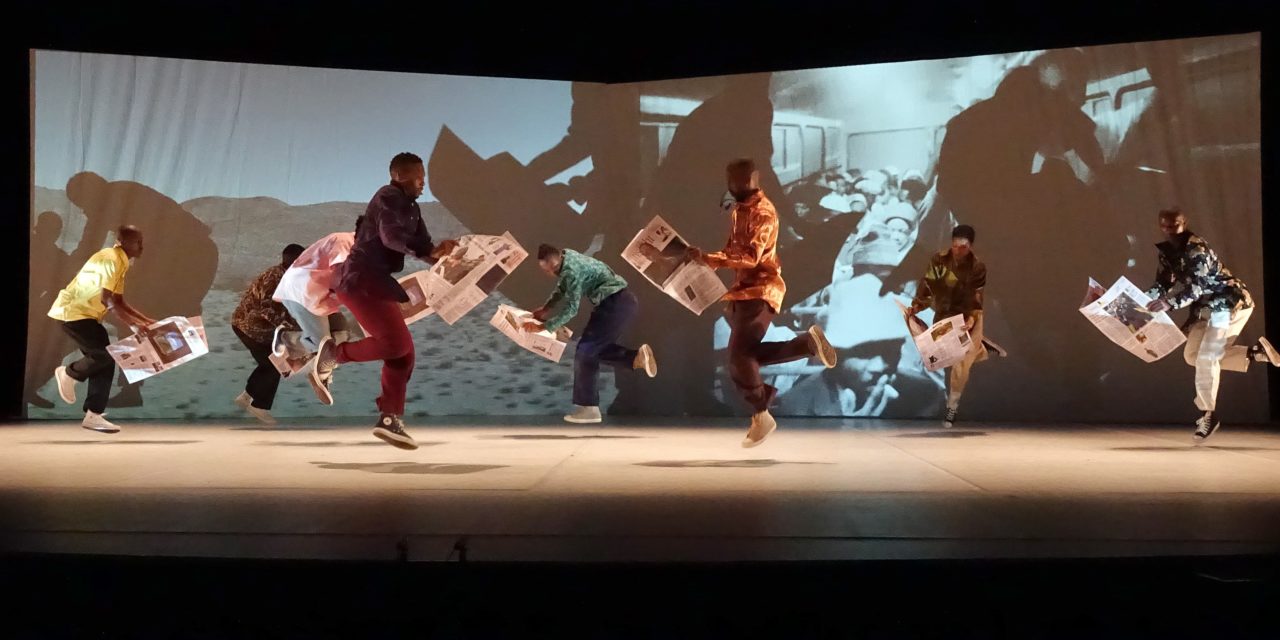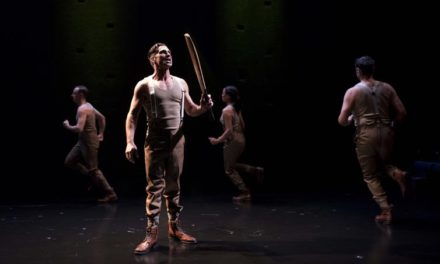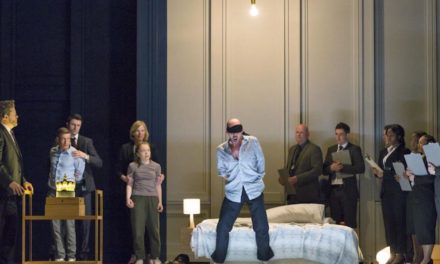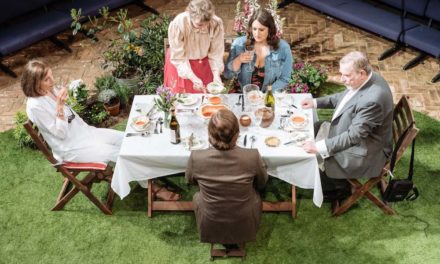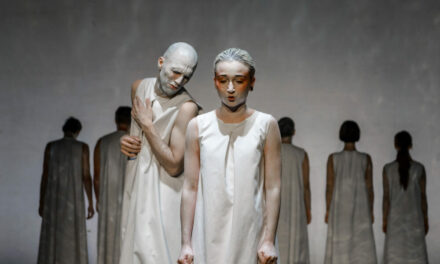The platform stage erected in Shoreditch Town Hall’s grand Victorian assembly room is receiving a pounding. Eight pairs of Converse sneaker-clad feet slam into the floor with alarming force, their speed and rhythm rivaling that of a runaway train. The style of dancing exhibited here by members of the South African group Via Katlehong is called Pantsula, an Apartheid-era form of tap that first developed in the townships of Johannesburg in the 1950s. It has since assimilated many other influences, from traditional African dances to music videos, popping, locking, and breaking. The energy is relentless. As one dancer says, “If you don’t have energy, you can’t dance Pantsula.”
For Via Kanana, the dancers of Via Katlehong have teamed up with contemporary choreographer Gregory Maqoma, who has brought structure and a political message to the hour-long piece. The title draws on a South African expression meaning “the promised land that never arrives.” It begins with one word: Corrupt. Projected onto an angled white screen at the back of the stage and repeated again and again as part of the electronic soundtrack, it seems to trip up one man who is, initially, alone on stage. Each repetition makes him stumble, fall to the floor, struggle to get up. Soon he is joined by more people. They form a group, huddling together in tense silence. One after another, they break out into expressions of need, anger, or frustration before being pulled back into the group.
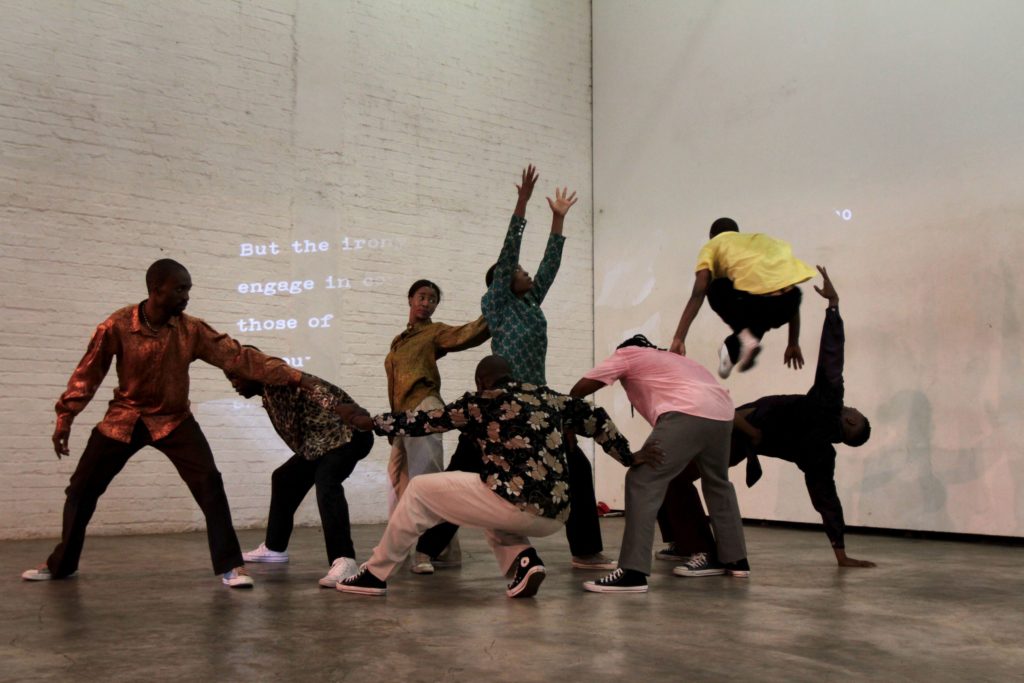
Dance Umbrella 2018. Via Kanana, part of Out Of The System. Photo by John Hogg.
The scenes that follow all explore the dynamic of the group, which becomes a microcosm of a larger–perhaps universal–society. Almost everybody remains on stage throughout. Scenes flow into each other as short sections of perfect unison fracture into outbreaks of conflict and aggression. There is a power play, competition, coercion, and seduction. The smallest woman, a fierce dancer, takes on the role of a conjurer, reeling in the others one by one and bending them to her will. A man resists but is coaxed into performing for the group, like a dog being asked to do tricks for treats: “Come on, come on, come on, here’s a treat for you–what do you want? We’ll give you money!”
Finally, he cracks and breaks into an explosive dance routine to gain his reward. Other set pieces include a love triangle with an unexpected twist into sexual violence and a stunning scene on a commuter train to a projected backdrop of black-and-white landscapes.
It is an inspiring piece of dance with a powerful message, condemning the corrosive effects of corruption on society and expressing frustration at how little has really changed for the better for black people in South Africa since the end of Apartheid. It does this without ever feeling literal or didactic, thanks to the loose, collage-like structuring of scenes, words, and projections, and, more importantly, to the utterly committed dancers who balance absolute precision with complete abandon. Their feet, hands, torsos, faces, voices, and eyes tell an urgent story better than most words ever could. As soon as the lights come down, the audience is on its feet, celebrating them with a unanimous standing ovation.
Via Kanana by Via Katlehong and Gregory Maqoma
Choreographer: Gregory Maqoma
Composer: Samuel Makhathada Khabane
Lighting Designer: Oliver Hauser from Hauser Lighting Design
Videographer: Jurgen Meekel
Costumes: DarkDindie Styling Concepts
Dancers: Tshepo Nchabeleng, Tshepo Mohlabane, Thato Qofela, Abel Vilakazi, Teboho Diphehlo, Andile Nhlapo, Julia Burnham, and Boitumelo Tshupa
Via Kanana was brought to London by Dance Umbrella, the city’s annual festival of international dance. It was part of Out Of The System, a festival-within-the-festival and a celebration of diversity, curated by Freddie Opoku-Addaie.
Lisa Marie Bowler is a London-based writer, translator, editor, and dramaturg specializing in dance. She worked at Sadler’s Wells for several years before completing her Ph.D. at the Ludwig-Maximilians-University in Munich with a thesis on the phenomenology of theatre architecture. Together with Emma Gladstone and dance dramaturg Guy Cools she published the body: language series of talks with choreographers, dancers, and artists. In 2014 she participated in the Mellon School of Theater and Performance Research at Harvard University, and from 2016 to 2017 she was on the Executive Committee of the Dramaturgs’ Network. Currently, she coordinates Creative Europe–funded large-scale cooperation project Dance On, Pass On, Dream On.
This post was written by the author in their personal capacity.The opinions expressed in this article are the author’s own and do not reflect the view of The Theatre Times, their staff or collaborators.
This post was written by Lisa Marie Bowler.
The views expressed here belong to the author and do not necessarily reflect our views and opinions.

